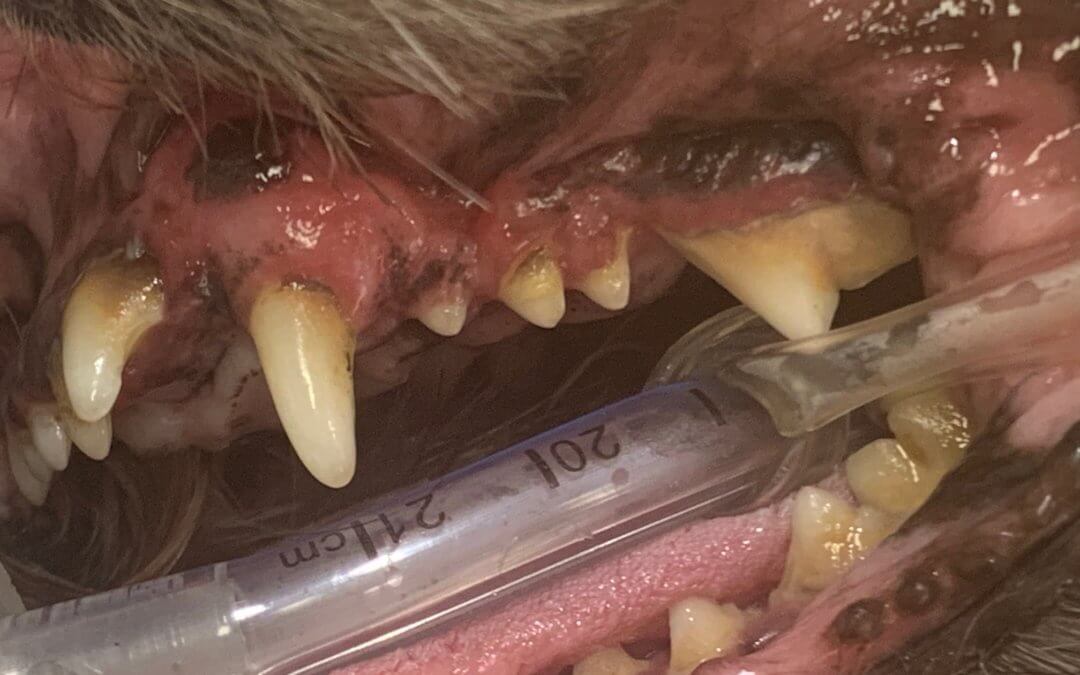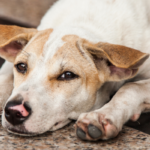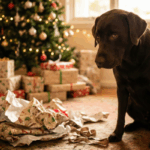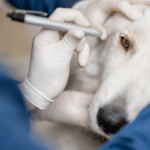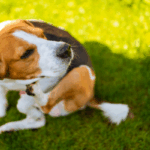Periodontal disease (dental disease) is the most commonly diagnosed disease in both dogs and cats. This condition is so common that by the time they are two years old 70% of cats and 80% of dogs will show signs of dental disease.
What causes dental disease?
Dental disease occurs due to a build up of plaque on your pet’s teeth, which leads to gingivitis (red, swollen, infected gums) and bad breath. In time gingivitis leads to teeth becoming loose and painful due to the infection eating away the bone and tooth attachments. To relieve pain and the infection teeth often need to be removed via extractions during a dental procedure or in severe instances if left long enough will fall out of their own accord due to the severity of the infection. Severe dental disease if left untreated and un-monitored can affect not only the mouth but also the heart, kidneys and liver. Therefore, keeping up with your pet’s dental care is very important.
What you should look for?
There are many factors that can potentially make your pet more susceptible to developing dental disease, such as poor oral hygiene, age and breed. Dental disease is more common in smaller breeds of dog as they often suffer from teeth overcrowding. Our pets will often not show pain, in some instances patients with sore gums, infected mouths and broken teeth will continue to eat. This can make it difficult for owners to initially acknowledge any problems. However, signs that your pet may be suffering from dental disease can include;
- Bad breath
- Yellow-brown tartar build up on teeth
- Red inflamed or bleeding gums
- Changes in eating habits
- Loose teeth or tooth loss
- Abnormal drooling
How to prevent dental disease:
We often get asked if there is anything that can be done at home to help prevent dental disease and the answer to this is yes. Here is how you can help your pet fight dental disease;
Brushing your pet’s teeth:
This is the best method to help prevent dental disease just like with people. If your pet is tolerant then introduce tooth brushing slowly, with patience and plenty of rewards. Many pet owners have great success with brushing their pets’ teeth. Introducing brushing in a puppy is important as puppies are generally a lot more open to toothbrushing than an older dog. Doing this 2-3 times a week is a good starting point for puppies. If dental disease is developing then it will need to be increased to daily brushing.
Dental diets:
We are now privy to specialised prescription diets, such as Hills Prescription Diet t/d™ and Royal Canin Veterinary Dental. These diets are both specifically designed to help reduce the build up of plaque and tartar on your pet’s teeth, as well as aid in cleaning them. The kibble is slightly larger and requires more chewing than regular kibble, encouraging loose plaque and tartar to be dislodged from the pet’s teeth. The food also helps to form a natural barrier on the teeth to reduce the plaque build up coming back.
Food/Water Additives:
Products such as Healthy Mouth™, Plaque-Off® and Oxyfresh® can be easier to use for pets that don’t like the dental diets or having their teeth brushed. They are beneficial in helping prevent/slowing down plaque build-up but won’t break down existing plaque and tartar.
Regular Checks with the Veterinarian:
Twice yearly checks with the vet is advised to help maintain your pet’s oral hygiene. We can assess the level of dental disease your pet may have and create an individualised treatment and care plan for you to continue at home. Sometimes intervention with the vet is required for teeth and mouths that are showing signs of progressive dental disease. This procedure is performed under a general anaesthetic to clean and protect healthy teeth and if needed extract severely infected or broken teeth.
Raw Bones:
Raw bones are advocated by some to assist in dental care but we warn that you need to be aware of the risks.
- Raw meats are a risk for salmonella and other causes of gastroenteritis.
- Bones are hard and are a common cause of broken teeth leading to the need to extract teeth
- Fragments can be swallowed and get stuck or cause damage to the stomach or bowel.
- Bones can lead to excessively hard poo and constipation in some pets.
A few rules to go by if you chose to take on these risks.
- Only feed raw bones.
- Feed whole big bones that won’t break in to smaller shards and get swallowed.
- Give a fresh new bone every 2- 3 days for half an hour then take it back and throw it away.
- If they bury it throw it away and find another option.

